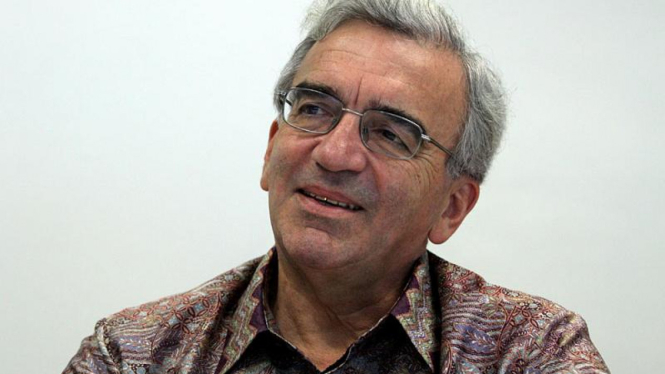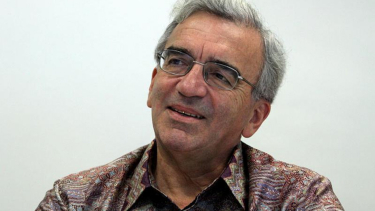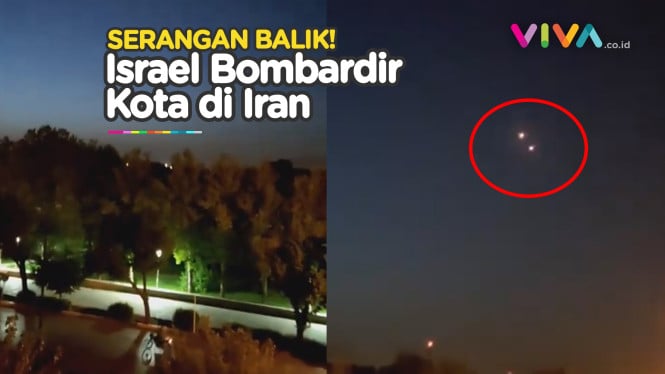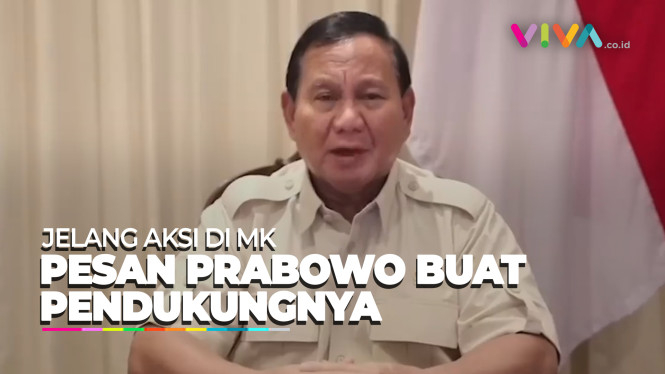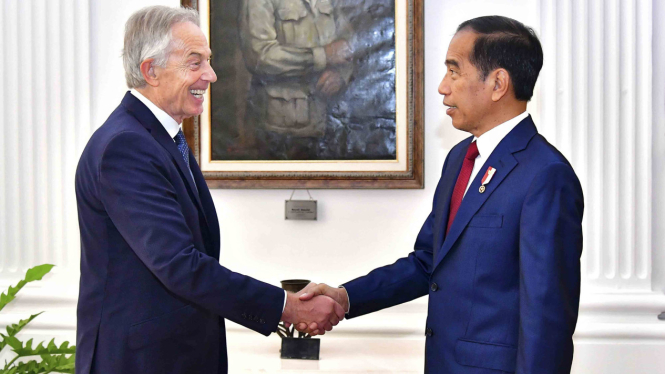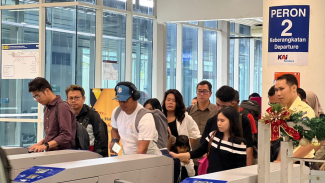Indonesia, A Great Place for Aussie Diplomats
- VIVAnews/Adri Irianto
VIVAnews - One of the most memorable moments for Ambassador Bill Farmer is when witnessing a speech delivered by Indonesian President Susilo Bambang Yudhoyono (SBY) at the Parliament House, Canberra, on March 10, 2010. The Australian parliament rarely invite foreign leaders to make a speech.
"I was extremely proud to be in the Parliament House, witnessing the way those parliament members gave their cheerful response to SBY's speech. They stood up, giving a standing ovation at the end of his speech. For me it was the culmination of my duties in this country for more than four years," Farmer said during a visit to VIVAnews office in Jakarta, Friday, April 16, 2010.
Having served as an Australian ambassador to Indonesia since November 2005, Farmer's mission will come to an end this July. Before coming to Indonesia, Farmer was the Australian ambassador to several countries - Mexico, Cuba, Papua New Guinea, and Malaysia. However, Indonesia might be the longest overseas diplomatic post for him - a country which seems to be the last mission for Ambassador Farmer before retiring.
"I will miss a million things here. However, I want to return next October to Yogyakarta to take a walk again on the edge of paddy fields in the morning. It is an exciting experience," said Farmer, a Padangnese cuisine enthusiast who likes to wear batik shirts.
Farmer is satisfied that during his ambassadorial mission in Indonesia, he has been witnessing a number of important moments that brought relations between the two countries to the warmest stage. Apart from increasingly official visits, the intensity of the relationship between citizens from two nations even more intensive.
He said that the exchange programs involving officials, editors of mass media, and students could help reduce misunderstanding or negative opinion between people from two countries.
Indonesia might have been the longest overseas post in your diplomatic career. What makes you staying longer in this country?
Well, there's a very personal answer to that [question]. For Australia, Indonesia is our biggest embassy, which covers enormous range of subjects and we deal, of course, many issues in Indonesia. So, professionally, for Australian diplomats, this is an extraordinarily rich and satisfying posting.
For me the honest answer is that in some ways I feel that a lot of my career has been preparing me for this assignment. So I found that very consuming and absorbing and positive period to be working here.
The answer is largely personal that it has for me really been a culmination for my career, the high point and I just enjoy it enormously. I think the time has come, five years, and I have grandchildren want to see me in Australia but in terms of this experience for me, this is really very good.
Compare to a few years ago, do you think the bilateral relationship has now been much better?
I think if you go back to 1999, it’s a low point in our relationship because of the different perspective of East Timor. That persisted for a while, but I think, for example, that the enormous and quick response from both the Australian government and private sectors to the 2004 tsunami. I think that [response] washed away some of sort bad feelings and it has become a turning point.
During those years, Australia and Indonesia were cooperating in new way. For example, we together began co-hosting regional initiatives on people smuggling and counter-terrorism and we worked very well.
As we are close neighbors, we are always going to have lots of issues. The majority of them are always going to be positive, whether it is political, economic, trade or investment issues or other issues involving our citizens. We have issues, and when issues come up, we deal them in a very constructive way.
The relationship between Indonesia and Australia has been growing stronger since the signing of the Lombok Treaty (13 November 2006). Do you see this treaty as the monumental stage for the two countries in improving bilateral relationship?
I think the Lombok Treaty is enormously important. In the last five years, the response to the tsunami in Aceh was symbolically important.
The Lombok treaty is extremely significant in the whole area of security, peace, police cooperation, military cooperation, transportation safety, custom, and a whole range of issues. The Lombok Treaty gives us the umbrella for developing our relations.
Now we have a plan of actions between the governments for putting more substance into those security cooperation and other issues. The treaty also specifically has commitments that neither country will support separatism in the other.
So the highlights of the relationships over the last few years are the response to the tsunami in Aceh and the Lombok Treaty. Now, I think we have to focus more attention in the future is the area of trade and investment. We have a substantial relationship but I think we can have it considerably greater.
Now our bilateral trade is about Aus$11 billion, but Indonesia is not our biggest trading partner in ASEAN (Southeast Asia). Our investment in Indonesia is between Aus$4 billion and Aus$4.5 billion. I think, given the experience of the Australian companies in our region, that figure could and should be more.
Looking the other way, I would think there is less investment by Indonesian companies in Australia than by Malaysia or Singapore. I think our trade and investment relationship could be substantially enhanced.
We have feasibility studies into the idea of an enhanced economic cooperation arrangement and the governments are looking into that arrangement. The feasibility studies have been prepared and have been released. The governments are already talking about that. They have not made any announcement yet about when we might go to the next phase. That’s under very active consideration right now.
The other big thing I focus on in terms of the changing relationship between Indonesia and Australia is the huge change taking place in Indonesia over the last ten years.
Now every government, business, and individuals do is subject to somewhat similar processes in both Indonesia and Australia: clearly an active and robust media, looking at issues. You have got parliament which is in both cases pretty robust. The public opinion is very free, very open. I think we have now two democracies dealing with each other. It is very significant development.
There are some negative opinions among Australians about Indonesia and the other way around regarding some moments in the past. How both governments overcome this matter?
President Susilo Bambang Yudhoyono during his speech in the Australian Parliament has identified the questions of perception as the very important one: There are still outdated perceptions in Australia of Indonesia, as well as outdated perceptions in Indonesia of Australia. I think that is absolutely correct.
So we have a very significant issue to deal with. That is why it is very important really looking at the role of leaders and the media. As you know, from last month we have exchanged senior editors and in the last couple of years we have Australian journalism students coming to Jakarta for couple of months for an internship program in some local media.
I think those programs are important because it means a lot of these people have spent two months in Indonesia, so they would have an understanding, maybe not for now, of Indonesia. I think the exchanging programs between the media and other sort of leaders, including Islamic leaders, young political leaders, have developed better understanding between people from two countries.

Photo caption: Ambassador Bill Farmer (right) with the chief editor of VIVAnews.com, Karaniya Dharmasaputra.
What about the current Australian government position over the issue of Papua?
What Papuans need is to be prosperous part of the Republic of Indonesia. So what you really need is wise government from Jakarta. You have a full implementation of the special autonomy provisions, continuing respects of human rights and you have an emphasis on the political and social development.
To some extent, our views on Papua are the same with our views on the other parts of Indonesia. We have a special development focus in eastern Indonesia including in Nusa Tenggara Barat, Papua, Papua Barat, Sulawesi, and Kalimantan.
For Australians, it is our interest that Indonesia is prosperous, and stable and democratic. It is your interest as well.
There is no question of supporting separatism or anything like that in Indonesia. In Australia, because we are also democracy, we certainly have some individuals who have a different view and I think that is the effect of having a democratic life. But for Australia, the continuing assistance for Indonesia to be more prosperous is one of the most important objectives we would have in our foreign policy.
How significant is the public attention in Australia to the Papua separatism issue?
If you are working or living in Australia, the issue of Papua is not something that you get in the media every day, every week, or every month.
It is not a big issue. The numbers of people who really have an active interest in the sort of issue are relatively very small.
On the issue of illegal fishing, do you see a significant decrease of Indonesian fishermen arrested for breaching the Australian water?
Yes. I think this is a very success story between two countries. In the last four years the number of Indonesian boats apprehended in Australia has declined by 90 percent. Four or five years ago, there were about 500 boats per year, now it is less than 50.
I think that’s because a number of reasons. One is that we have set the enhanced police patrol. Secondly, both countries have cooperated in a public information campaign in eastern Indonesia. They hold village meetings, they also talk through the radio and hand out easy-to-understand maps showing the areas and they know the areas very well.
In some Australian waters, we permit traditional fishing there in certain conditions but we also explain fishermen some areas where they cannot fish at all. I think the campaign has been a very successful program.
Now we have a bigger issue in regional level that both governments have shared their interest. One is that even if we could stop illegal fishing from third countries, for example from China or Taiwan, the waters would become fished-out. So there is a big question of sustainability of the fish stocks.
We have done a very good work together, how we can control illegal third country fishing and a number of coordinated patrols between Indonesian and Australian custom vessels. We have a new system of exchanging information about illegal vessels in our zone.


